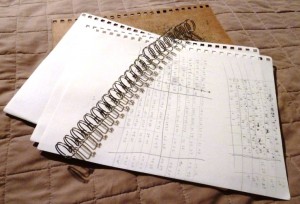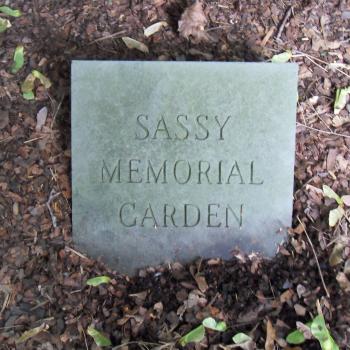 I’m in the attic staring at boxes. One is labeled Journals, 1979-1985. Another is Journals, 1986-1990. Another is Letters: friends and family, 1975-1982. Another…
I’m in the attic staring at boxes. One is labeled Journals, 1979-1985. Another is Journals, 1986-1990. Another is Letters: friends and family, 1975-1982. Another…
But I stop to muse: Look at these hundreds of pages of letters exchanged in only seven years. Typed or handwritten originals from recipients; carbon copies of my replies. Yes, we wrote long letters then, and treasured them enough to keep them.
And the journals. Spiral bound notebooks that I kept by hand daily from 1979 until a couple years ago, though the past ten years or so are scanty. That’s because I started using the computer for all my writing.
The journals had been my “commonplace books,” as I thought of them, modeling myself on Virginia Woolf. She kept notes of her reading, notes for writing projects, and personal reflections all in one consecutive notebook. Once I started thinking of myself as a writer, I imitated her practice.
So in these boxes of notebooks is a record of my every thought during about thirty years.
And they all have to go.
My husband and I are in the winter of our life. The winter could last twenty years or a day, but it’s all the same season. We remember the burden it was for us and for our siblings after our parents died, when we had to sort through and throw out boxes and boxes and boxes of stuff that our aged parents had gotten too frail to deal with. Thirty-some years of tax returns, bank statements, utility bills. Ancient address books, the people listed mostly long since gone.
George and I don’t want to do this to our surviving family. Our model for dealing with the “stuff” of life is George’s cousin Mary (actually, first cousin of George’s father). When Cousin Mary’s father died, she sold the rambling family home, sensibly purged most of the contents, and moved into a two-bedroom apartment that wasn’t the least bit cluttered. She told us she’d done this to make the aftermath of her death simple and joyful for her family. And it was. She’d even designated certain items to go to certain people; George and I received her daily prayer book.
Up in my attic now, I find that tossing out the old bank statements and tax returns is easy. It’s the personal letters that are harder—all those records of moments of friendships. But at least they’re loose pages in folders; once George and I decided they have to go, we just put them out at the curb on recycle day.
My journals are the really tough things to deal with: physically and emotionally. Since they’re bound with metal spirals, we can’t just put them on the curb. We need to tear out all the pages first, then throw the metal spirals out separately from the paper. Anyway, I don’t want someone coming along while the journals are on the curb and taking them or reading through them. They’re too personal.
This is also what makes the process tough emotionally. It’s hard enough to tear out pages and pages of notes from years of reading and writing projects. But I console myself: the books and articles that all these notes led to are long since published (well, except for the ones that never got published!). So what’s the point of saving all the behind-the-scenes work that went into each book or essay?
But it’s even harder to rip out all the personal notes: anguish over troubled relationships, hopeful promises of what I’ll do for Lent, fun things our son did as a child, painfully detailed notes after each session with the therapist I went to for a few years…
I try not to look at all this as I rip, but since I have to tear out the pages a handful at a time, it’s difficult not to see a bit of what’s on them.
I’m tearing up my life.
Or am I?
Is a life what was lived in the past? Or is it the present moment?
Of course, we are in some ways products of our past. But that doesn’t mean we should cling to the past’s material products. Only the present moment is real. God was in each of those past moments; but God only is in the present moment.
So I ask George to haul the box labeled Journals, 1991-8 down from the attic. (It’s much too heavy for me to lift.) And I get to work ripping.
I can rip only one journal at a time, though; the physical and emotional strain is too much (not to mention the paper cuts). As a break, I go in the other room and pick up my knitting. I’m making a delightful baby sweater, with perky white ducks on the front. It’s for one of the charities that our knitting group at church makes things for.
Creating something fun with my hands is a blessing in this present moment. I can forget about the past and focus on watching the little ducks take shape on my knitting needles.
A final note. I’m not unaware of the irony that everything I’ve written in this post is exactly what I would have hand-written in my journal in years past. And writing this post has served the same purpose that my “personal” journal entries used to do. Today when I began to write these lines, I was agitated, stressed by all the ripping out of my past. In fact, the agitation is what moved me to go to my computer and write.
Now, having written this post, I’m no longer agitated. I’m calm and comfortable in the present moment.
How writing does this is a mystery to me. But I’m mighty grateful for it.
Peggy Rosenthal is director of Poetry Retreats and writes widely on poetry as a spiritual resource. Her books include Praying through Poetry: Hope for Violent Times (Franciscan Media), and The Poets’ Jesus (Oxford). See Amazon for full list. She also teaches an online course, “Poetry as a Spiritual Practice,” through Image’s Glen Online program.











